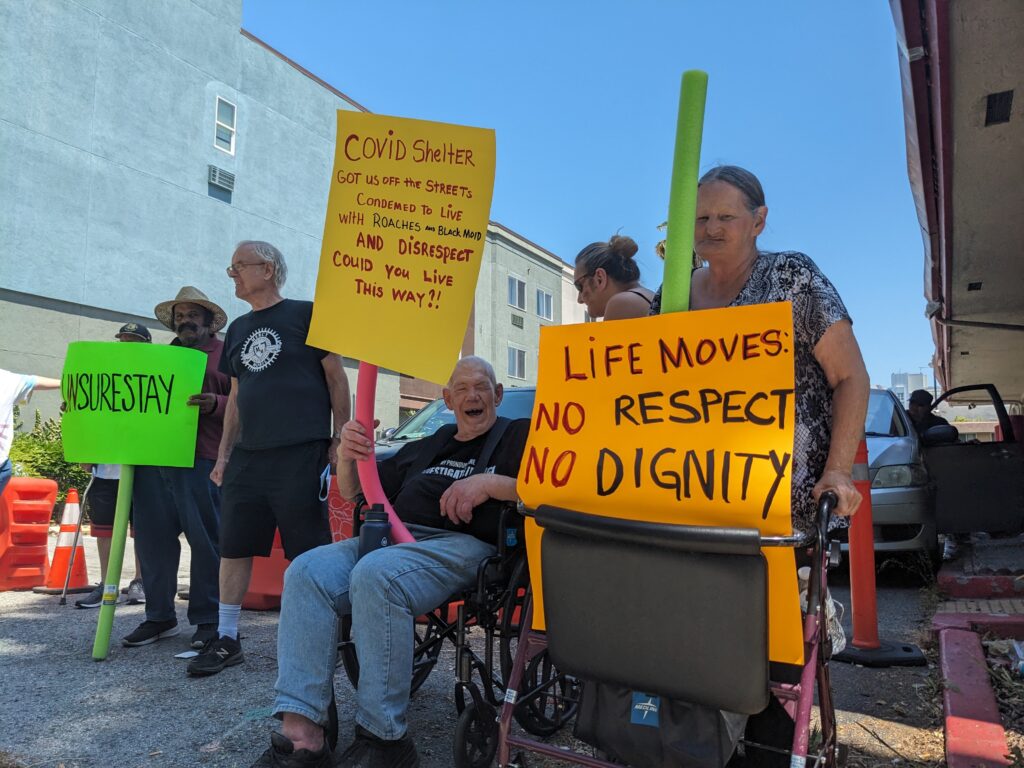Christina Correa was homeless for 11 years before finding temporary housing. She moved into SureStay Hotel in North San Jose one year ago, an environment she said is cockroach infested, peppered with mold and has faucets that spew dirty tap water. She never imagined getting off the streets would put her health at risk.
The hotel was one of the first to be repurposed by San Jose for interim housing under Project HomeKey, a program designed to get homeless people off the streets during the COVID-19 pandemic. From the start, the project has been on shaky ground. With years of unsafe housing problems and city mismanagement, residents are fed up and frustrations have hit a boiling point.
Correa and about 10 other SureStay residents, along with housing advocates, protested outside the hotel yesterday, holding neon signs and calling for better living conditions after years of neglect.
“Even on the street when I was homeless, I didn’t have to deal with cockroaches like this,” she told San José Spotlight. “This is bad.”

Residents of the 76-room hotel are calling for operators to clean up the cockroaches and mold and provide a permanent path to housing. They also want to be treated with dignity and respect, as they’re housed under strict conditions where they say management uses the siren on a bullhorn to notify them when meals are ready.
Tenants told San José Spotlight meals, which are provided three times a day, are only available for 10 to 15 minutes. They are not allowed to bring food to their neighbors with mobility issues from the parking lot where it is served.
Correa requested a move from the second floor to the first in anticipation of a surgery around September, which would make it easier for her to access services provided at the hotel. Due to her health, she can’t move her items on her own and her caretaker is currently unavailable. Management offered no additional assistance and refused to change her move-out date from July 30, she said.
“Every day is a risk,” Correra, 55, told San José Spotlight, adding she has the potential to experience a sudden aneurysm. “It is scary.”
San Jose is partnering with the Santa Clara County Housing Authority to redevelop the hotel. Discussions with the city to transfer ownership to the housing authority are ongoing, according to city and housing authority officials. The city decided to move in this direction after San Jose and Abode Services were unable to provide safe living conditions.
San Jose secured $2.5 million in federal funding in January to maintain operations.
LifeMoves, a housing services operator, stepped in during the transfer and will remain on site to help transfer supportive services to Jamboree Housing Corporation, a nonprofit affordable housing developer that provides residential services. A Jamboree spokesperson said the agreement is too premature for comment.
“We are committed to not exiting anyone at this facility to homelessness,” Brian Greenberg, vice president of programs and services at LifeMoves, told San José Spotlight.
A San Jose spokesperson said the city conducts inspections of the hotel and makes improvements as needed, and that maintenance work and repairs are ongoing. The city isn’t aware of mold at the property, and code enforcement inspectors visited in June.
“While various violations were found, primarily related to smoke detectors, these issues were repaired on-site during the inspection and no violation notice was issued,” the spokesperson told San José Spotlight.
A housing authority official deferred comment to the city.
SureStay tenants have created a petition for their demands, and have received signatures from 19 residents living at the hotel. But some are afraid to speak out due to fear of retaliation from management.
Martin Boone, 78, has lived at SureStay on and off since it opened. He doesn’t believe the issues there will be resolved in his lifetime.
“People give you promises, and then they pass you on to somebody else and then the next person gives you a promise,” he told San José Spotlight.
Boone said he couldn’t move out of SureStay if he wanted to due to the cost of living.
“There’s no way I can get a job making $4,000, $5,000 a month to (have) a house in this area,” he said. “This is Silicon Valley. You have to have a Silicon Valley job making Silicon (Valley) money.”
Contact Annalise Freimarck at [email protected] or follow @annalise_ellen on Twitter.



Leave a Reply
You must be logged in to post a comment.